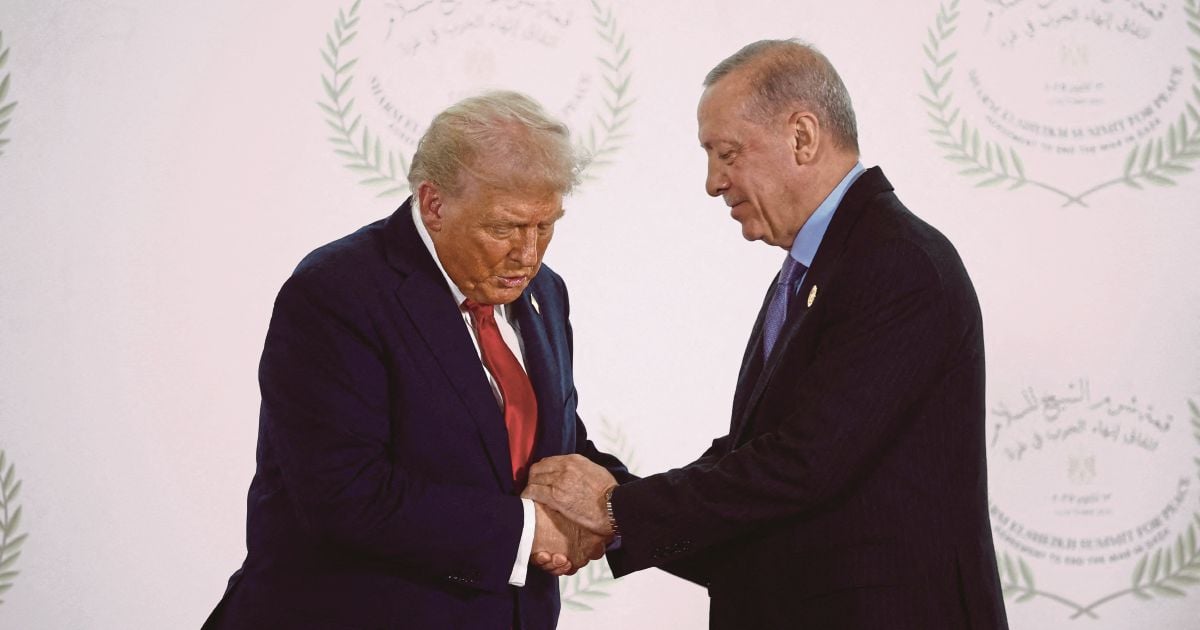TURKIYE’S ties to Hamas, once a liability in Washington, have turned into a geopolitical asset. By persuading Hamas to accept United States President Donald Trump‘s Gaza deal, Ankara has reasserted itself on the Middle East chessboard, to the dismay of Israel and Arab rivals.
Initially resistant to the US president’s ultimatum — free the Israeli hostages or face continued devastation — Hamas leaders relented only when Turkiye, a country they view as a political patron, urged them to agree to the American plan.
Two regional sources and two Hamas officials told Reuters that Ankara’s message was unequivocal: The time had come to accept.
“This gentleman from a place called Turkiye is one of the most powerful in the world,” Trump said last week, referring to Turkish President Recep Tayyip Erdogan, after the Palestinian group agreed to a ceasefire and hostage-release plan.
“He’s a reliable ally. He’s always there when I need him.”
Erdogan’s signature on the Gaza document supercharged Turkiye’s push for a central role in the Middle East, a status Erdogan has increasingly sought to reclaim, often invoking Ottoman-era ties and leadership.
Now, after the deal, Turkiye is seeking to reap dividends, including in bilateral issues with the US, the sources said.
Sinan Ulgen, director of the Istanbul-based think tank EDAM and a senior fellow at Carnegie Europe, said Ankara’s success in delivering Hamas’s acceptance of Trump‘s Gaza deal has given it new diplomatic leverage at home and abroad.
Turkiye, he said, is likely to use its renewed goodwill in Washington to push for progress on stalled F-35 fighter jet sales, an easing of US sanctions and help in advancing Turkiye’s security goals in neighbouring Syria.
The diplomatic recalibration between Ankara and Washington, officials said, began during Erdogan’s September visit to the White House, his first in six years.
The meeting addressed unresolved flashpoints, including Turkiye’s push to lift US sanctions imposed in 2020 over its purchase of Russian S-400 missile systems, a move that angered Washington and also led to its removal from the F-35 programme.
Syria was another key topic. Turkiye wants to pressure the US-backed Kurdish Syrian Democratic Forces (SDF) to merge into the Syrian army. Ankara views the SDF as a threat due to its ties to the Kurdistan Workers’ party, which Turkiye designates a terrorist group.
That push appears to be gaining ground. SDF commander Mazloum Abdi confirmed a mechanism to merge with the Syrian army, an outcome Turkiye sees as a strategic win.
The Gaza deal follows other boosts to Turkish prestige. Trump praised Erdogan for hosting Russia-Ukraine talks earlier this year, and Ankara’s influence grew after Bashar al-Assad’s fall in Syria last year, where Turkiye backed opposition forces.
For years, Ankara was not part of high-level efforts to solve the Israeli-Palestinian dispute, a core source of regional instability. Turkiye’s support for movements like Hamas strained ties with Israel and several Arab states, and its perceived drift under Erdogan from North Atlantic Treaty Organisation norms further distanced it from peacemaking.
But to break the deadlock in Gaza ceasefire talks, Trump turned to Erdogan, betting on the Turkish leader’s sway over Hamas. Turkish officials, led by spy chief Ibrahim Kalin, assured Hamas the ceasefire had regional and US backing, including Trump’s personal guarantee.
While Arab states shared an interest with Turkiye in ending the war, said Lebanese analyst Sarkis Naoum, the larger role given to Ankara was worrisome for them.
Turkiye’s Foreign Ministry and MIT intelligence agency did not respond to Reuters requests for comment. The US State Department did not immediately reply to a request for comment.
For Hamas, the main concern was that Israel might renege on the deal and resume military operations. Deep distrust nearly derailed the process, regional sources said.
“The only real guarantee,” a senior Hamas official told Reuters, “came from four parties: Turkiye, Qatar, Egypt and the Americans. Trump personally gave his word. The US message was: ‘release the hostages, hand over the bodies, and I guarantee there will be no return to war.'”
Turkiye’s entry into the talks was initially vetoed by Israel, but Trump intervened, pressuring Israel to allow Ankara’s involvement, two diplomats said.
There was no immediate comment from Israel’s foreign ministry.
A senior Hamas official said Gaza’s military leaders accepted the truce not as surrender, but under the crushing pressure of relentless mediation, a collapsing humanitarian situation, and a war-weary public.
Whether the Gaza deal will eventually open a way towards a Palestinian state remains unclear. Turkiye and Arab states including Qatar and Egypt say the plan lacks a roadmap towards a two-state solution, a historic Palestinian demand.
* The writers are from Reuters
© New Straits Times Press (M) Bhd






